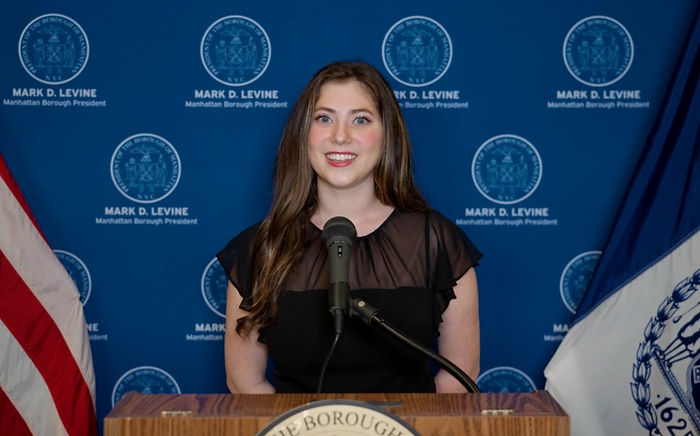(LOS ANGELES) — Amid the hustle of New York City, where access to a public restroom is a rare find, Theodora “Teddy” Siegel champions the cause as an advocacy journalist, drawing attention to the issue with her Got2GoNYC initiative.
In 2021, during the height of COVID-19, Siegel grew frustrated over New York City’s scarcity of free and accessible public restrooms.
Approximately, 15% of the U.S. population has irritable bowel syndrome, or IBS, according to a Johns Hopkins University page on the disease. Additionally, roughly 1.3% have been diagnosed with inflammatory bowel diseases like Crohn’s disease or colitis. Access to restrooms is a basic human right, yet many find stress in the lack of access, especially in major cities. It’s equally frustrating when one is asked to make a purchase to use the restroom.
When Siegel was asked to make a purchase to use a bathroom in Times Square she knew there was something fundamentally wrong. She began posting photos and videos of bathroom codes wherever she went. Followers of her Got2GoNYC platforms contributed with updates on codes, bathroom quality, and their experiences, boosting her profile.
With over 8.5 million residents, New York City has only 1,200 public restrooms. Siegel is advocating for that change, working with Manhattan Borough President Mark Levine and council members in New York City to address this infrastructure issue and public health concern. Thanks to Siegel’s advocacy, the city passed Intro 258, or “The Bathroom Bill.” This legislation mandates that the mayor must identify an agency to report on potential restroom locations in every ZIP code, the number of current operating facilities, and gather public input on new installations.
In January, Siegel penned an opinion piece for The New York Times titled “If New York Is So Great, Why Isn’t There Anywhere to Pee?” In it, she describes creating a Google map pinpointing public restrooms across New York’s boroughs. Her map is fully integrated with the app, ensuring immediate user access once they download the extension. Some of her most viewed social media videos are those where she rates public restrooms. Siegel shows the facilities, comments on accessibility, and gives her recommendations. She frequently spotlights the Bryant Park public bathroom as an ideal choice for those in Midtown, Manhattan.
Recently Siegel began interviewing New Yorkers on the street about restroom scarcity and their experiences. She publishes stories on her website from those willing to share their stories in writing and keeps them anonymous. Siegel highlights the discrimination many people face as they seek public restroom access. One poignant story is from a Black delivery driver who works nights and struggles to find safe and nondiscriminatory bathrooms to use while on his shifts. What Siegel does might not fit the traditional mold, but it embodies advocacy journalism. She consistently presents accurate statistics and maintains source confidentiality. Siegel is using her platforms to influence and enact change.
Businesses may resent Teddy Siegel for sharing their restroom codes, and TikTok has taken down a number of her videos for unspecified reasons, but for many who view restroom access as a fundamental right, the ethical stance is clear.
Correction: An earlier version of this story reported that Siegel has irritable bowel syndrome when she has not been diagnosed with the disease.


